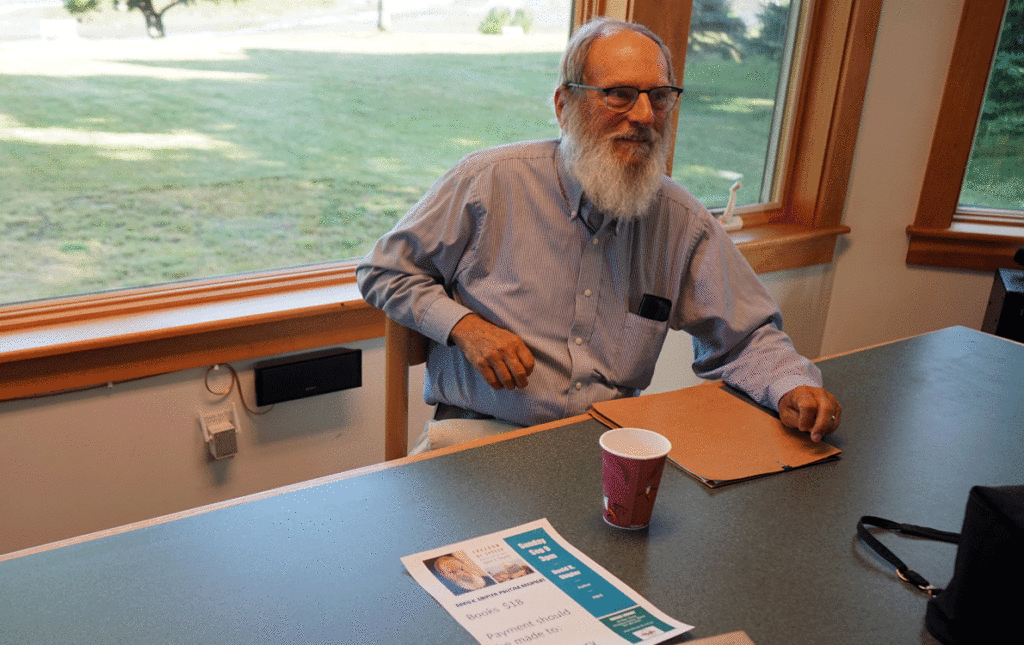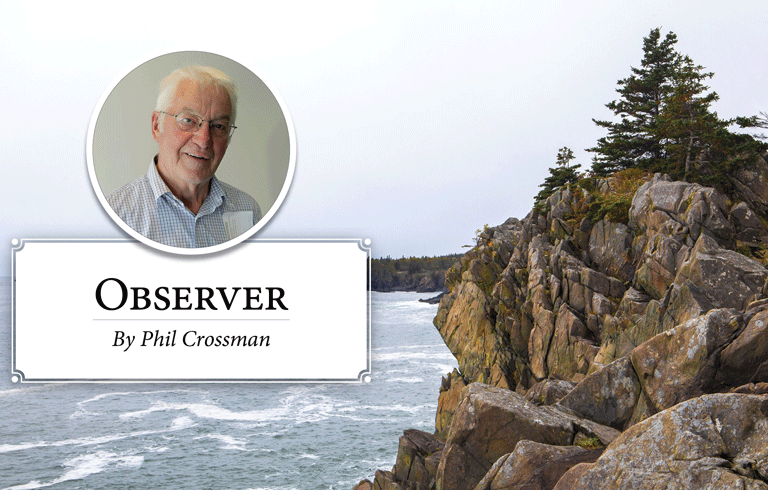By Tom Groening
When the New York Times published a “name withheld” op-ed column from a purported senior White House official on Sept. 5, most everyone had an opinion about the newspaper’s decision and what it may have revealed about the Trump administration.
David Shipler had an opinion, too. But as a former Times reporter, and the author of three books on civil liberties, his views were, well, a bit more informed than those of most of us.
His view is that the newspaper’s op-ed editor should have referred the senior White House official to the reporting side—opinion and reporting typically have a “church and state” separation at newspapers—to further flesh-out the claims being made, perhaps drawing in other administration sources. Shipler made the observation while speaking at Prospect Harbor’s Dorcas Library on Sept. 9, days after the Times op-ed.
Shipler and his wife Debby, a retired social worker, are summer residents of Swan’s Island, where they have enjoyed down time, sailing, and getting to know other islanders since the early 1980s. He remembers chartering a power boat in the early 1970s, cruising the Maine coast and seeing a house on an island and saying, “Oh, man! I want that.”
After finding that buying a small island was cost prohibitive, Shipler, 75, learned of a peninsula on Swan’s Island that was for sale. He and Debby purchased Roderick Head in 1979 and built a house there in the mid-1980s. Recently, the couple put a conservation easement on the land around the house through Maine Coast Heritage Trust to protect it from development.
Island life for the couple is more than retreat, though.
“I enjoy knowing everybody,” he said over lunch, prior to the speaking engagement. “We have quite a few friendly relationships with year-rounders. The beauty of the place is really overwhelming. Every day, the colors are different, the light is different. It’s just spectacular.”
And Shipler has seen enough of the world for his opinion about the relative beauty of a Maine island to have weight. After serving in the U.S. Navy aboard a destroyer based in Norfolk, Virginia, he worked for the Times as a reporter from 1966 to 1988.
At the start of his career, “I was on the housing beat in New York City,” a coverage area that afforded access to some of the key issues of the mid-1960s: poverty, drugs, crime, health, public housing, labor unions, and politics. “It was one of the best educations you can get.” His work won him awards from newspaper associations.
When he was ready for a change, he looked overseas.
“I had agitated for a foreign assignment for some time,” he remembered, and was finally sent to Vietnam in 1973, just as the U.S. was ending its fighting there. He wrote about the South Vietnamese in their effort to fend off the North, while based in Saigon.
“Most of the fighting was in the countryside,” he said, downplaying the danger. “Cambodia was different.” Once, fighting broke out behind him on the road he was traveling and he was cut off from escape for a time.
In 1975, he began a four-year stint covering Russia for the Times, including two years as bureau chief. It was there that he wrote Russia: Broken Idols, Solemn Dreams, which became a best-seller and won an Overseas Press Club award.
Then it was on to Israel for the Times, a stint that also yielded a book, Arab and Jew: Wounded Spirits in a Promised Land, which won a Pulitzer. He also won, along with Thomas Friedman, the George Polk Award for coverage of the Lebanon War. Later, Shipler wrote books on poverty and race relations, with the latter earning him an invite to an event with two other authors from then-President Bill Clinton.
TALKING FREE SPEECH
His three civil liberties books—The Rights of the People, Rights at Risk, and Freedom of Speech—informed his talk at the library.
Setting the scene, Shipler rattled off the positions asserted by Alex Jones of Info Wars: the Sandy Hook school shooting was a hoax, 9/11 was “an inside job,” as was the Oklahoma City bombing.
“Before the internet,” he said, “Jones would have been relegated to handing out leaflets on the sidewalk.” Trump, he added, met with Jones before the election, telling him, “Your reputation is amazing. I will not let you down.”
The free speech flag is often waved when such positions provoke outrage. Shipler placed the idea in context.
“When we’re mapping the landscape of free speech, there are two overlays that can be applied,” he said—government and society. Government, through courts, establishes that speech can be limited, so it cannot be used to incite violence, or as the Supreme Court noted, “You cannot falsely shout ‘fire’ in a crowded theater.”
The society overlay is the public’s condemnation of comments, or private sector businesses firing employees for speech deemed offensive, as long as the objection is not tied to race, gender, sexual orientation, etc., he said.
“Those cultural norms are shifting,” Shipler said.
And government’s application is not always evenly applied.
The Supreme Court upheld the offensive—but protected—speech of members of the Westboro Baptist Church, who held signs at military funerals. But police moved sign-holding protestors of then-President George W. Bush away from his public appearances, while allowing pro-Bush signholders to be close to the stage.
Shipler said 77 percent of Americans say they support the First Amendment, but only 40 percent could name a right it protects. When Trump refers to the news media as “enemies of the people,” he said, “It really has a chilling echo to me, as a person who lived in the U.S.S.R.”
And when the Soviet Union fell apart, it broke into ethnic nations and ethnic-based hatred because, Shipler believes, free speech had been suppressed.
“Free speech and its impact requires critical thinking,” he said. “It requires education.”





